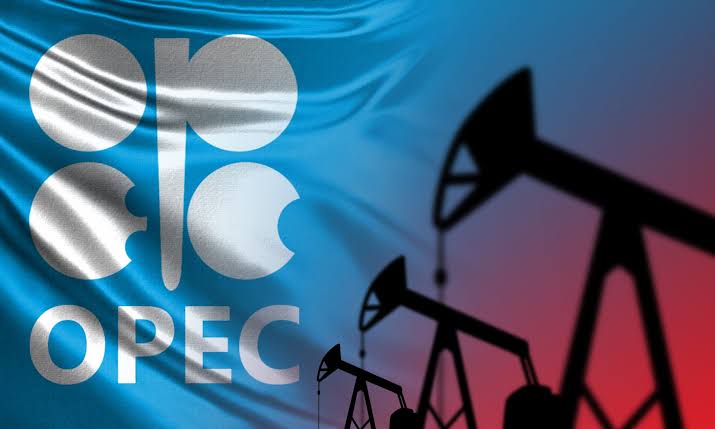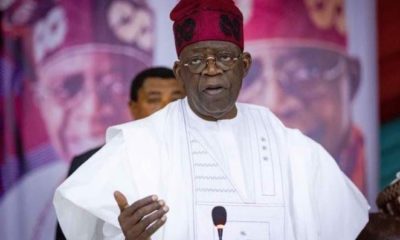Oil
OPEC Slashes Nigeria’s Oil Output By 20.7% To 1.38 mb/d

In an effort to stabilize the global market, the Organization of Petroleum Exporting Countries and its allies, commonly referred to as OPEC+, have reduced Nigeria’s oil production, excluding condensate, by 20.7 percent.
The country’s daily output has been lowered from 1.74 million barrels per day (mb/d) to 1.38 mb/d.
The decision expected to take effect from January 2024 was taken at the crucial meeting of the 49th Meeting of the Joint Ministerial Monitoring Committee (JMMC) and the 35th OPEC and non-OPEC Ministerial Meeting, in Vienna, Austria, monitored by Vanguard, yesterday.
According to the new voluntary adjustment program adopted by the organization, Saudi Arabia will be the highest producer, targeting a production level of 10.48 million barrels per day (mb/d). Conversely, Sudan will have the lowest production level at 64,000 barrels per day (bpd).
As outlined in the program, OPEC member states, collectively producing nearly 25 million barrels per day (mb/d), continue to hold a significant share of the global oil output. Meanwhile, non-OPEC countries contribute approximately 15.5 mb/d to the global oil production.
In a statement issued by OPEC+, the organization expressed its unwavering commitment to attaining stability in the global market, despite the various challenges and issues it currently faces.
It stated: “In light of the continued commitment of the OPEC and non-OPEC Participating Countries in the Declaration of Cooperation (DoC) to achieve and sustain a stable oil market, and to provide long-term guidance for the market, and in line with the successful approach of being precautious, proactive, and pre-emptive, which has been consistently adopted by OPEC and non-OPEC Participating Countries in the Declaration of Cooperation.
The Participating Countries decided to reaffirm the Framework of the Declaration of Cooperation, signed on 10 December 2016 and further endorsed in subsequent meetings; as well as the Charter of Cooperation, signed on 2 July 2019.”
It also agreed to, “Adjust the level of overall crude oil production for OPEC and non-OPEC Participating Countries in the DoC to 40.46 mb/d, starting 1 January 2024 until 31 December 2024, which to be distributed as per the attached table.
“Reaffirm and extend the mandate of the Joint Ministerial Monitoring Committee (JMMC) and its membership, to closely review global oil market conditions, oil production levels, and the level of conformity with the DoC and this Statement, assisted by the Joint Technical Committee (JTC) and the OPEC Secretariat. The JMMC is to be held every two months.
“Hold the OPEC and non-OPEC Ministerial Meeting (ONOMM) every six months in accordance with the ordinary OPEC scheduled conference.
“Grant the JMMC the authority to hold additional meetings or to request an OPEC and non-OPEC Ministerial Meeting at any time to address market developments, whenever deemed necessary.“
“Reaffirm that the DoC conformity is to be monitored considering crude oil production, based on the information from secondary sources, and according to the methodology applied for OPEC Member Countries.
“Reiterate the critical importance of adhering to full conformity, and subscribe to the concept of compensation by those countries who produce above the required production level as per the attached table, in addition to their already decided production levels.”
Oil
NNPC Targets 60% Methane Emission Reduction By 2031
The Nigerian National Petroleum Company Limited (NNPC) has unveiled a bold strategy to reduce methane emissions in the oil and gas sector by 60% by 2031, with an ultimate goal of achieving net-zero emissions by 2060.
This announcement reinforces Nigeria’s leadership role under the Global Methane Pledge initiative and its commitment to tackling climate change.
The Group Chief Executive Officer of NNPC, Mele Kyari, disclosed these plans during a meeting on Thursday with Robert Leahman, the U.S. State Department’s Global Methane Program Manager, and a delegation from Deloitte.
READ MORE: Atiku Gloats Over AUN’s Achievements Ahead Of 20th Anniversary
The discussions, held at the NNPC Towers in Abuja, focused on collaborative efforts to reduce methane emissions through innovative and sustainable practices.
“Reducing methane emissions is not just an environmental necessity but also a strategic imperative for Nigeria’s energy transition. We are leveraging partnerships to adopt global best practices and innovative solutions,” Kyari stated.
Key among these efforts is a pilot project in the Niger Delta, aimed at establishing emissions baselines, mitigating methane leaks, and promoting sustainable operations across Nigeria’s energy sector.
The project, a partnership between NNPC, Deloitte, and the U.S. Bureau of Energy Resources, will utilize data-driven methodologies to pinpoint and address methane hotspots.
Robert Leahman commended Nigeria’s proactive stance, describing it as a benchmark for other nations on the continent.
“Nigeria’s leadership under the Global Methane Pledge sets a standard for the continent. These initiatives will not only help reduce emissions but also drive sustainable development in the energy sector,” he said.
Kyari highlighted the broader benefits of addressing methane emissions, noting its significance for both environmental protection and economic efficiency.
“This collaboration is a game-changer. By addressing methane leaks, we’re reducing waste, saving costs, and protecting the environment. It’s a win-win for our economy and the planet,” he added.
Oil
FG Introduces New Incentives To Revitalize Nigeria’s Oil & Gas Industry
In a strategic move to revitalize Nigeria’s oil and gas sector, the Federal Government has unveiled two key fiscal incentives aimed at attracting investment and enhancing energy security.
The announcement was made by Mr. Wale Edun, the Minister of Finance and Coordinating Minister of the Economy on Wednesday.
The first initiative, the Value Added Tax (VAT) Modification Order 2024, introduces critical exemptions for essential energy products and infrastructure, including Diesel, Feed Gas, Liquefied Petroleum Gas (LPG), Compressed Natural Gas (CNG), Electric Vehicles, Liquefied Natural Gas (LNG) infrastructure, and Clean Cooking Equipment.
Read Also: Atiku Calls For Rotational Presidency Across Nigeria’s Geopolitical Zones
These exemptions are designed to reduce living costs for Nigerians, promote energy security, and accelerate the transition to cleaner energy alternatives.
The second initiative, the Notice of Tax Incentives for Deep Offshore Oil & Gas Production, offers new tax relief options for deep offshore exploration projects.
This measure aims to position Nigeria’s deep offshore basin as a premier destination for international oil and gas investments, boosting the country’s appeal to foreign investors.
These reforms are part of a broader set of policy initiatives, known as Policy Directives 40-42, endorsed by President Bola Ahmed Tinubu.
The directives reflect the administration’s commitment to fostering sustainable development in the energy sector and enhancing Nigeria’s competitive edge in the global oil and gas market.
Business
Tinubu set to approve ExxonMobil-Seplat oil deal, expands CNG bus initiative

By Yemie Adeoye
NIGERIA’s President Bola Tinubu has announced that the protracted ExxonMobil-Seplat upstream oil divestment will be formally approved by the Minister of petroleum within a matter of days, just as he announced his government’s intention to expand the Compress natural Gas, CNG buses initiative.
The President who stated this during his Independence day nationwide broadcast stated that the move is in line with his administration’s commitment to free enterprise, free entry and free exit in investments which is the hallmark of his administration investment policy.
“Fellow compatriots, our administration is committed to free enterprise, free entry, and free exit in investments while maintaining the sanctity and efficacy of our regulatory processes. This principle guides the divestment transactions in our upstream petroleum sector, where we are committed to changing the fortune positively. As such, the ExxonMobil Seplat divestment will receive ministerial approval in a matter of days, having been concluded by the regulator, NUPRC, in line with the Petroleum Industry Act, PIA. This was done in the same manner as other qualified divestments approved in the sector.”
The President also seized the opportunity to plead with Nigerians to be patient with his administration’s reform policies. “As your President, I assure you that we are committed to finding sustainable solutions to alleviate the suffering of our citizens. Once again, I plead for your patience as the reforms we are implementing show positive signs, and we are beginning to see light at the end of the tunnel”.
“Our energy transition programme is on course. We are expanding the adoption of the Presidential Initiative on Compressed Natural Gas for mass transit with private sector players. The Federal Government is ready to assist the thirty-six States and FCT in acquiring CNG buses for cheaper public transportation.
Fellow Nigerians, while we are working to stabilise the economy and secure the country, we also seek to foster national unity and build social harmony and cohesion. Our economy can only thrive when there is peace”. he enthused.






















